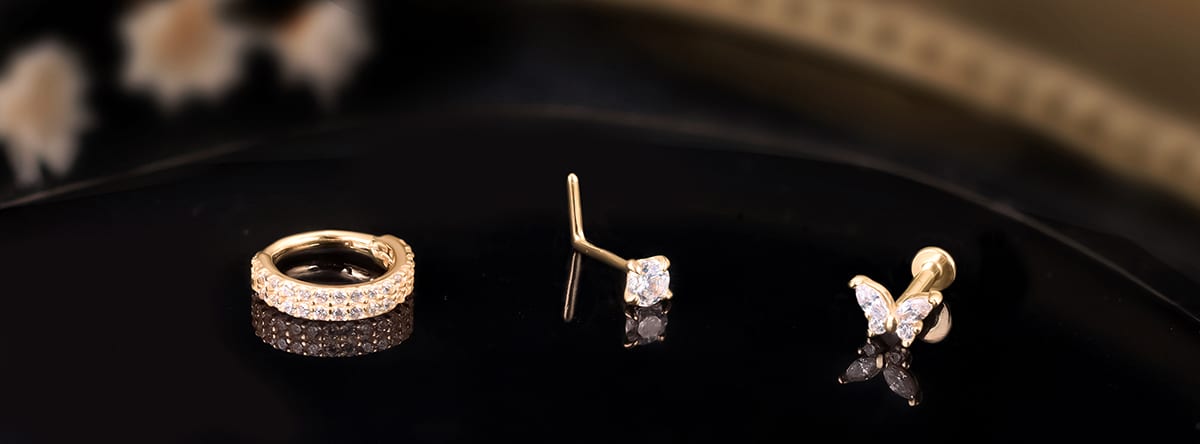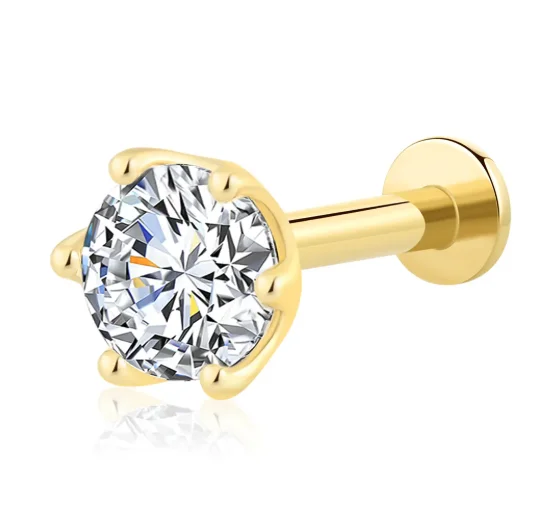Correo electrónico:wholesale@goldpiercingfactory.com WhatsApp:+14086905740


Getting your nostril pierced is exciting, but anyone who has ever fumbled with a tiny hoop in the mirror knows the truth: not every piece of jewelry is equally easy to put in. Some designs slide in smoothly, others feel like they’re fighting you every step of the way. If you’re new to piercings, or if you simply want to save yourself the hassle, the kind of nose jewelry you choose makes all the difference.
Below we’ll explore which nose rings are easiest to insert, how material matters, and where premium designs like solid gold threadless studs or seamless rings step in. We’ll also look at what Gpf, a trusted wholesale gold body jewelry supplier with over 15 years of experience, brings to the table.
Threadless studs are often the first recommendation for people who want quick, no-drama insertion. Instead of twisting tiny threads into place, you just push the decorative top into the post until it holds. It takes a few seconds, and because there’s no threading, there’s less chance of scratching the inside of your piercing.
Seamless rings (sometimes called “endless hoops”) click or bend shut without a bead in the middle. For nostril piercings, this means you don’t have to line up a captive bead every morning—just slide it through and close. Many people love these for everyday wear because once it’s in, it stays put and looks sleek.
L-shaped studs and screw-shaped nose pins are classic. They’re secure once you figure out how to put them in, but they can be fiddly for beginners. If you’ve had your piercing for years and don’t mind the extra twist, these are fine. If you’re still learning, though, a threadless or seamless style will make life easier.
Not all metals are created equal. If you’ve ever worn low-quality jewelry and noticed redness or irritation, that’s usually nickel reacting with your skin. 14K solid gold—like the jewelry GPF produces—is naturally hypoallergenic, durable, and safe for long-term wear.
Cubic zirconia may not be diamond, but in the piercing world, it’s a star. It catches the light beautifully and doesn’t irritate skin when it’s set in solid gold. For nostril rings, CZ stones add just enough sparkle without overwhelming a small space.
GPF emphasizes certification and monthly quality checks. This might sound like a behind-the-scenes detail, but it’s what guarantees your jewelry doesn’t bend out of shape after a few weeks. Longevity matters—no one wants to keep replacing their nose ring because of a bad clasp.
Take the 14K Solid Gold Threadless Labret Stud with CZ Stone – Classic 6-Prong Setting. It’s designed to hold the stone securely while still being incredibly easy to slide in. You just insert the post, push the top until it clicks, and you’re done. No need for pliers or a second pair of hands.
For a more glamorous option, the 14K Solid Gold Threadless Labret Stud with 6 CZ Stones works the same way but offers extra sparkle. It’s ideal for someone who wants their nostril piercing to double as a statement piece.
Both these labret studs feature flat backs. That means they sit flush against your skin, don’t poke inside the nostril, and won’t catch when you pull a sweater over your head. Small detail, big comfort.
The 14K Solid Gold Seamless Ring with Seven CZ Stones is an elegant example. The stones run along the curve, and the closure is nearly invisible. That smooth design means you’re not fighting a sharp edge when you insert it.

Many people describe wearing a seamless ring as “forgetting it’s there.” It’s lightweight and hugs the nostril comfortably. This makes it a solid option if you don’t want to feel your jewelry every time you smile or sneeze.
Because of the closed-loop structure, once it’s in, it doesn’t spin or shift much. You’re not constantly readjusting in the bathroom mirror, which, let’s be honest, is a small relief on busy mornings.
Gauge size is crucial. Most nostril piercings are done at 18G or 20G. If you try forcing a thicker ring in, it won’t just be uncomfortable—it might actually damage the piercing channel.
Hoops, especially, depend on diameter. Too small and the ring pinches the nostril; too large and it droops awkwardly. A piercer can measure for you, but a quick rule of thumb is 8mm for petite noses and 10mm for average.
It’s tempting to buy that gorgeous gold ring right away, but ask your piercer if your piercing is healed enough for it. A pro’s quick yes or no can save you weeks of irritation.
If you’re just out of the piercing chair, less handling equals faster healing. A stud that goes in easily is simply less invasive day-to-day.
There’s something empowering about changing your own jewelry without panic. Easy-to-insert designs help beginners build that confidence early on.
Struggling with a tricky screw can lead to dropping jewelry on the bathroom floor (and yes, everyone’s done it at least once). Choosing beginner-friendly styles lowers that risk.
Based in Qingdao, China, GPF has been exporting fine gold body jewelry worldwide for over 15 years. Orders move fast—DHL or UPS often arrives in just 2–4 days for wholesale clients.
If you’re a retailer looking to create your own line, GPF offers OEM and design services. That means you can take an idea from sketch to finished gold nose ring without running your own factory.
GPF also backs its jewelry with a lifetime guarantee. In a market where many suppliers disappear after the sale, that kind of commitment matters.
Q1: Can I wear solid gold jewelry right after getting my nose pierced?
A: Most piercers recommend waiting until your initial healing period is over before switching to gold. However, 14K solid gold is generally considered safe once healing has begun because it’s hypoallergenic.
Q2: How do I clean my gold nose ring at home?
A: Mild soapy water and a soft cloth usually do the trick. Avoid harsh chemicals or abrasive cleaners—they can scratch the surface and dull the shine.
Q3: What makes threadless jewelry different from threaded styles?
A: Threadless jewelry uses tension to hold the top in place instead of tiny screw threads. This makes it much faster to insert and less likely to scratch the piercing channel.